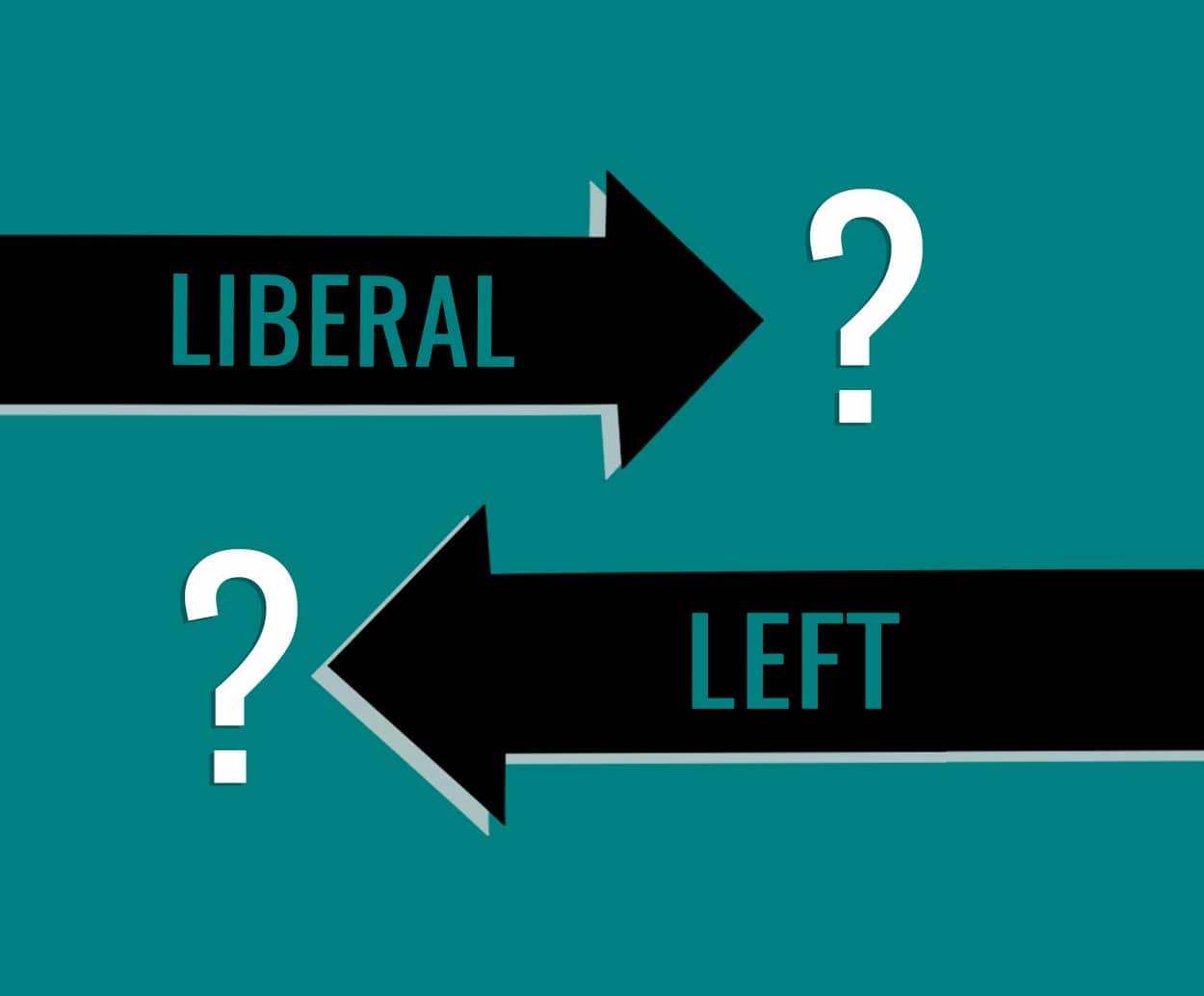If you want to be realistic about today’s political problems, there’s only one solution – look to the analysis of the radical left.
Students will sometimes ask me — often hesitantly, out of fear of offending — if it’s true what they’ve heard, that I’m a liberal.
“Don’t you ever call me a liberal again,” I tell them, feigning outrage. “I’m a leftist and a radical feminist.” Once they realise I’m not really angry, I explain to them the important differences between left and liberal.
A distinction between left and liberal may seem esoteric or self-indulgent, given the steady ascendancy of right-wing ideas in U.S. politics. In an age when the president of the world’s largest polluting nation wants to withdraw from climate change agreements, is now really the time for a conversation on such petty differences? Liberals ask leftists to put aside any theoretical differences towards the goal of resisting the reactionary right, and I’m all for pragmatic politics to mount challenges to dangerous policies. Coalitions are necessary and potentially creative. I believe that Donald Trump, Mike Pence and Paul Ryan pose serious threats on ecological, social and economic fronts, and thinkers from the centre to the left should unite together to defend against this.
However, strategies should be based on a clear understanding of shared values. With a carnival-barker president leading a party so committed to a failed ideology that it’s willing to risk ecocide, radical left ideas have never been more compelling. In the face of conservative and liberal failures to deal with our most basic problems, its radical leftists who offer reality-based solutions.
Let’s start with a general distinction. Liberals typically support existing systems and hope to make them more humane. Leftists focus on the unjust nature of the systems themselves. Two of these key systems are capitalism (an economic system that, to a leftist, celebrates inequality and degrades ecosystems) and imperialism (a global system in which First World countries have long captured a disproportionate share of the world’s wealth through violence and coercion). Liberals don’t tend to oppose capitalism or U.S. imperialism, arguing instead for kinder-and-gentler versions. Leftists, however see the systems as incompatible, with basic moral principles of social justice and ecological sustainability.
Things get further complicated when white supremacy (historical and contemporary practices rooted in white or European claims of a right to rule) and patriarchy (men’s claim to a natural role over women in systems of institutionalised male dominance) are thrown into the mix. Leftists disagree among themselves about how these systems interact with capitalism and imperialism. Some on the left focus on class inequality and decry “identity politics,” which they define as reducing all political questions to race, gender or sexual identity. Others reject putting economic inequality alone at the centre of politics and argue for an equal focus on white supremacy or patriarchy.
Complicating things more are leftists who disagree with radical feminist opposition to the sexual-exploitation industries of prostitution, pornography and stripping, instead arguing that women’s participation means the industries can’t be challenged.
What is a Leftist?
If this is all bewildering, welcome to left politics. Rather than generalising about what “real” leftists should believe, I’ll summarise my own views, as a person who aligns themselves on the far left of the political spectrum.

Capitalism is an unjust wealth-concentrating system that is ecologically unsustainable. Either we transcend the pathology of capitalism, or dystopian science fiction will become everyday life in the not-so-distant future. There is no credible defence of the obscene inequality, or disregard for the larger living world that’s inherent in capitalism.
The assertion by the U.S. that it’s the world’s exemplar and natural leader is a dangerous delusion that must yield to meaningful diplomacy and trade policies based on moral principles, and not raw power. There is no hope for global cooperation when the U.S. maintains hundreds of military bases and facilities in other countries, designed not for defence but to assert U.S. dominance.
Liberals and conservatives disagree about how government policy should constrain the sociopathic nature of capitalism, but both embrace capitalist ideology. Liberals and conservatives disagree about how the U.S. should run the world, but neither challenge the country’s right to dominate.
What do leftists propose as an alternative to a global capitalist economy, held up by military might? I’m not a revolutionary utopian and I instead prefer innovative ways to work toward left values. Two examples:
The worker cooperative movement helps people establish worker-owned and worker-managed businesses within capitalism, creating spaces for real democracy in the economy. An example in my hometown of Austin is ATX Coop Taxi, owned and managed by the drivers. The most well-known cooperative enterprise is Mondragón, a Spanish federation of cooperatives with thousands of worker-owners. These businesses offer a model for a transition out of capitalism.
National health insurance, sometimes known as single-payer or Medicare-for-all, would lower health care costs while rejecting the cruel capitalist assertion that people without money are expendable. Most developed countries have adopted this, but U.S. politicians routinely reject it, even though polls show a majority or a plurality of U.S. voters like the idea. This kind of commitment to collective flourishing challenges obsessions with amoral individualism so common among U.S. capitalists.
Untangling white supremacy
The history of white supremacy cannot be untangled from the history of capitalism and imperialism, in both Europe and the U.S. Ideologies of racial superiority have been used to justify imperialism abroad (the infamous “white man’s burden” to civilise the natives), while at home, racism is a key component of the wealthy’s divide-and-conquer strategy to suppress worker organising across racial lines. (A popular example is to offer white workers a sense of racial superiority so that they focus their anger at non-white people rather than the bosses).

A critique of patriarchy, the oldest of these domination/subordination systems, is at the heart of any credible left politics, though it is the social system most routinely ignored by leftists. The patriarchal claim that such hierarchy is inevitable is one of the most dangerous myths in human history, long used to justify men’s control of women’s reproductive power and sexuality.
Defending women’s reproductive rights, including abortion, is a core principle, and just as central is challenging men’s claim to having a right to buy and sell objectified female bodies for sexual pleasure. We must confront men who buy women for sex as we act in feminist solidarity with prostituted women (what liberals call “sex workers”), supporting programs that help women and vulnerable men exit the sexual-exploitation industries.
Men’s claims to own or control women’s sexuality are also at the heart of the oppression of lesbians (who dare to opt out of male dominance in intimate relationships) and gay men (who are targeted for their perceived threat to patriarchy’s rigid sexual norms). Lesbian/gay liberation is inseparable from women’s liberation.
Liberals and conservatives are all over the political map on racism and sexism, but consistently fail to face the depth of the depravity of white supremacy and patriarchy, or the degree to which those systems continue to define everyday life. Leftists strive to face these realities.
Realistic solutions
What kind of a leftist am I? I don’t call myself a Marxist, Communist, Socialist or Anarchist, though all of those traditions offer insights along with lessons from their failures. I don’t belong to what are called “left sectarian” organisations, which typically remain committed to 19th- or 20th-century doctrines and political figures (such as Marxist-Leninist or Maoist groups). I call myself an anti-capitalist and anti-imperialist leftist rooted in a critique of white supremacy and a radical feminist critique of patriarchy. Not the pithiest label, but accurate.

My left politics also focus on the human species’ intensifying assault on the larger living world — multiple, cascading ecological crises that we can’t afford to ignore. Modern humans’ arrogance puts us all at risk. The naive assumptions of the high-energy and high-technology industrial world — especially the idea that we can solve all problems with more energy-intensive technology — must be abandoned as we struggle to understand how many people can live sustainably on the planet.
There’s not a widely used term for going beyond liberal environmentalism’s half measures, but some people call it “ecospherism,”- the understanding that humans must find our place in the ecosphere rather than trying to dominate. Ecospherists reject the idea that humans really “own” the Earth and fight to end the accompanying abuse and exploitation of land, water, air and other creatures.
Liberals and conservatives typically ignore ecological realities, but so does much of the left. The overwhelming nature of the challenge scares many into silence, but problems ignored are not problems solved. For example, research on renewable energy is important, but no combination of so-called clean energy sources can power the affluence of the First World. We should also remember that wind turbines and solar panels are industrial products, which can’t be manufactured cleanly. The solution is dramatically lower levels of consumption in the developed world.
Many people in the U.S. disagree with this kind of left/radical feminist analysis. Many people have told me that these views make me unfit to teach at a state university. I welcome serious challenges, but left political positions are too often dismissed as crazy because that’s the one thing both liberals and conservatives agree on.
The U.S. is a dramatically right-wing society when compared with other industrialised countries, illustrated by Bernie Sanders’ 2016 campaign. He offered no foundational critique of U.S. systems, opting instead for a traditional social democratic platform to make our institutions more humane. Yet in America, such policy proposals were seen by many as revolutionary and Sanders was often dismissed as a wild-eyed radical.
In a recent call to action, Sanders supported a single-payer plan for health care and stated “our current economic model is a dismal failure,” but he did not dare use the term capitalism or even hint at a deeper structural critique. His discussion of the ecological crises stopped with a weak call for renewable energy, and there was no mention of racism, sexism or U.S. foreign policy. I realise politicians shape rhetoric to win votes, but let’s not pretend this is a left agenda.
Sanders’ success suggests more people might support a candidate with an even deeper critique of illegitimate structures of authority. If in the short term the best we can hope for is reform of existing systems, we can pursue those reforms with an eye on more radical long-term goals.
It’s hard to imagine a decent human future — perhaps any human future at all — if these radical ideas are not part of the mix. “Radical” is often used as a political insult, suggesting people who focus on violence and destruction. But the word simply means “going to the root,” and at the root of our contemporary crises of justice and sustainability are capitalism, imperialism, white supremacy, patriarchy, and the human willingness to destroy the world in pursuit of affluence.
Leftists are told that we have to be realistic, and I agree. But how realistic is it to expect that solutions to human injustices and ecological crises will emerge from the systems that have created the problems?
If you want to be realistic, there’s only one solution – get radical.








Article Discussion